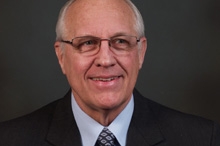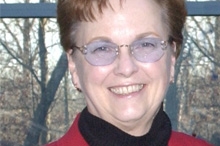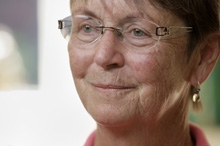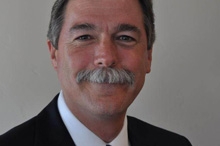Latest News
S4k
Posted by on April 17, 2013 at 1:47 PM EDT Tom Barnes is being honored as a Champion of Change for his efforts in being a Rotarian.
Tom Barnes is being honored as a Champion of Change for his efforts in being a Rotarian.
I was born and raised on a quintessential Iowa farm. Hard work and long hours ruled my youth. It was this environment that taught me that anything I wanted to accomplish could be done with enough elbow grease and fortitude. All the farmers belonged to one large family of neighbors that helped each other out when the need would arise. There wasn’t competition between the farms, just a general sense of what needed to get done to support our families and the people of the world with crops and livestock products. After this amazing upbringing, I found a love of manufacturing and was able to build a business that has allowed me to continue to give back to my community.
I found Rotary after my family was raised and I had the need to belong to a family-like group. Rotary is definitely that group. Everyone bands together to accomplish goals and help our community thrive.
In 2003, I took over a neglected project, Shoes for Kids (S4K). The Shoes for Kids project provides Payless Shoes gift cards to students identified and having a need by the school health administration. The benefit of new shoes over hand me downs is pride. Many of these students have simply never had the opportunity to go shopping and actually pick out what they want in a store. It is our hope that they will get two gifts out of our donation, new proper fitting shoes and a boost in their self-esteem. We also hope that they remember the feeling and pay it forward when life affords them that opportunity.
The glory of this project is that it can be replicated in any community. We started out by soliciting friends and local business leaders for donations, and by participating in local events, such as fairs and parades. Our giving base has expanded each year. To date we have donated over $70,700 in new shoes! You can make this happen in your town too. There is no better feeling than when a student writes a thank you letter in crayon letting you know how they love their first pair of new shoes, or when a school health administrator tells you about the student that came to school with holes in the bottoms of their shoes and the toes cut out so their feet were not smashed, and was able to go home with brand new sneakers.
Tom Barnes took over and made Shoes for Kids a success.
Learn more aboutPower of One: Shots For Tots
Posted by on April 17, 2013 at 1:27 PM EDT Harriett Schloer is being honored as a Champion of Change for her efforts in being a Rotarian.
Harriett Schloer is being honored as a Champion of Change for her efforts in being a Rotarian.
I clearly remember the day in October 1995 that I became a Rotarian. I had looked forward to becoming a member for quite some time. People join Rotary for many reasons, such as fellowship, friendship, networking, and service. For me it was all about service. My husband has been a Rotarian since 1977 and our entire family has worked with himon many Rotary service projects. I enjoyed my work as a Rotary spouse but wanted to be a Rotarian in my own right.
I was very proud to finally wear my Rotary pin.
In 1998, Walt and I attended our first Rotary International Convention. While there, we learned of The Rotary Foundation’s creation of the Children’s Opportunities Grants. The purpose of the grants was to save children’s lives and improve the lives of needy children. Hearing about these new grants was a “light bulb” moment for me. We live in Deschutes County, Oregon, which in 1998 had one of the lowest childhood immunization rates in the US, with less than forty-two percent of our children being fully immunized. Newborns, children in preschool, and school-age children were not getting the required immunizations and there was a complete lack of “herd immunity” in the schools, opening the opportunity for a potential epidemic.
I learned this when I was asked to serve as the Rotary representative on the Deschutes County Immunization Coalition (DCIC) and attended my first meeting. The coalition was seeking a way to reverse those statistics but there was no money to put together a program. The DCIC was asked to come up with a program and get it funded. When I heard about the Children’s Opportunities Grants, I knew I had found the funding; we just needed to create a program. The application for the “Rotary Shots for Tots” free immunization program was submitted to The Rotary Foundation in October 1998, and, in December 1998, the Rotary Club of Bend received a $25,000 Children’s Opportunities Grant to launch the program.
Shots for Tots and childhood immunizations are one of my passions, as is Rotary’s mission for the global eradication of polio. In 2009, I wrote an OpEd for the Bend Bulletin that focused on the growing trend of parents not immunizing their children. I wrote about the fear that gripped entire nations when there were no vaccines and an outbreak of polio or measles or another disease occurred. For me, there is no logical reason to not immunize children. It makes no sense. It is a potential waste of the life of a child. I know that the choice many young parents are making today to not vaccinate their children could eventually lead to needless, preventable illness, and even death. They have grown up in a time where they have never been witness to an epidemic that causes death or crippling. They believe that immunizations are no longer necessary because epidemics do not exist (at least not in the United States). They do not understand that potential infection is merely a plane ride away and the only sure protection is immunization. The Shots for Tots program is about saving children’s lives at no cost to their families, while at the same time making families fully aware of the importance of childhood immunizations.
Rotary could not do the Shots for Tots program alone. It had to be a community partnership between the seven Rotary clubs of Deschutes County, and all of the members of the DCIC (our DCIC members are from the public, private, service, medical, and educational sectors in our county). All seven clubs were on board, and the DCIC unanimously approved the program. More than 500 Rotary, medical, and community volunteers were recruited and trained. The media promoted the program and kept the free clinics at the forefront. PSAs on radio and TV told the importance of childhood immunizations. Immunization information was everywhere! During the first two years of the program our clinics were overwhelmed. Our message was being heard. Children were getting vaccinated. Shots for Tots was a huge success!
Since May of 1999, we have had 168 free clinics in four communities and more than 16,000 children have been immunized. Now in its 15th year, the program has become a Rotary model for community partnerships and has been replicated in three other Oregon counties and numerous Rotary Districts in the United States. Since 2002, Deschutes County has consistently ranked 2nd or 3rd in Oregon. The total value of the in-kind services donated by our partners is more than $6.3 million, not including the value of the thousands of volunteer hours.
Rotary has a belief in the “Power of One.” Everything we do in Rotary starts with an idea from a single individual. By working together, that idea becomes a reality and, if it’s significant enough, it will grow. Shots for Tots symbolizes the “Power of One” and, as a Rotarian, I was able to use that power and partner with others to help improve the lives of thousands of children. With Rotary’s help, we changed the way our county looks at health care not just for children but for everyone. I am very proud to be a Rotarian and I am honored and humbled to be recognized as a White House Champion of Change.
Harriett Schloer is the founder and Executive Director of Central Oregon Rotary Shots for Tots. She serves as the Rotary District 5110 Domestic Immunization Chair and the District 5110 PolioPlus Chair. She created the Pennies for Polio program in District 5110 in 2010 and in 2012 launched the PolioPlus Society. Since 2009, she has helped raise $485,000 for polio eradication in the district.
Learn more aboutSmokeTeam
Posted by on April 17, 2013 at 1:07 PM EDT Nancy Sanford Hughes is being honored as a Champion of Change for her efforts in being a Rotarian.
Nancy Sanford Hughes is being honored as a Champion of Change for her efforts in being a Rotarian.
I am thrilled and honored to be selected as a 2013 White House Champion of Change for my efforts in establishing StoveTeam International, an organization addressing the leading cause of death for children under age five.
Smoke from indoor cooking fires kills eight times as many individuals as malaria, and StoveTeam International is working to provide alternative cooking solutions to protect those most vulnerable: the women who cook over open fires.
In May 2001, my husband died after an eight-year battle with breast cancer. The following year my life took a new direction when I volunteered with a medical team in Guatemala. I volunteered for three years, and one day a young woman named Irma came into the kitchen where I was working and asked if she could speak to us. She had fallen into an open fire at the age of two. Her hands had been burned shut. For sixteen years she had prayed for a miracle, and our medical team restored the use of her hands. We were her miracle.
We needed to prevent these burns, but burns were only part of the problem. The babies strapped to their mother’s backs were breathing in the equivalent of three packs of cigarettes per day, and I learned that the leading cause of death for children under five was a lower respiratory infection caused by open cooking fires. Guatemala alone needed six million stoves, and I knew I had to do something.
The only solution was to make and sell safe fuel-efficient stoves that would save lives. Within a year, and with the help of the Eugene Southtowne and San Salvador Rotary clubs, I raised money and wrote a grant for stoves. Within the next few years we developed the new safe, portable, affordable fuel-efficient Ecocina stove that produces very little smoke. It saves both forests and lives by reducing wood consumption by 50% and carbon emissions by 70%. Once we tested the stoves, we helped a local entrepreneur start a factory to produce them. In the next few years, with his help, we set up more factories. There are now six sustainable factories in five countries with three more factories in development.
StoveTeam International continues to work with these local entrepreneurs who have created their own businesses and produced and sold over 30,000 stoves. Through our mission we have already improved the lives of over 240,000 individuals in Mexico and Central America—but we’ve only just begun. Learn more about StoveTeam International and how you can help here.
Nancy Sanford Hughes helped found Stove Team International.
Learn more aboutInvolve Me and I Will Understand
Posted by on April 17, 2013 at 12:47 PM EDT Douglas McNeil is being honored as a Champion of Change for his efforts in being a Rotarian.
Douglas McNeil is being honored as a Champion of Change for his efforts in being a Rotarian.
My dream to become part of the space program was set in stone the day I watched Neil Armstrong set foot on the moon. I was only nine at the time, but I can still feel the excitement of that moment. During my teens, I was selected to participate in NASA’s youth training program. We were trained by a couple of remarkable engineers who set such good examples that they paved the way for my career as an engineer, and later helped me with mentoring and developing programs for youth. To this day, I emulate the style of those engineers in hopes to inspire teens to pursue careers in science.
My engineering career began at NASA/Ames Research Center as an intern, then on to Lockheed Martin Missiles and Space, where I joined a team of engineers. At Lockheed I participated in the designing, developing, and launching of over 118 satellites with several launch service providers from three continents. I have held executive positions in several Silicon Valley cutting-edge companies, developing and launching new products for the Aerospace, Wireless Telecommunications, Laser Communications, Biometrics, and High-Throughput Materials Research industries. My work has taken me around the world. I have worked with and developed international business partners in Moscow, China, Australia, Taiwan, Germany, and France. Presently I am a Senior Director at Kinestral Technologies, Inc., in San Francisco.
As a parent of two children, the opportunity to coach and mentor young people for the past twenty years has been part of our family activity. With two active and very curious children, the scope of the programs ranged from sports, the environment, technology, space, and science. When I joined Los Gatos Morning Rotary Club, I embraced the chance to create a program that would engage local youth in Science, Technology, Engineering, and Math (STEM) in a way that would allow them to change the world for youth living in other countries.
A philosophy I often refer to when working with youth sets the tone for Lighting for Literacy:
Tell me and I will forget, show me and I might remember, involve me and I will understand. – Confucius
What began collaboratively with the Los Gatos Morning Rotary and Los Gatos United Methodist Church has now expanded to benefit multiple organizations. One Rotarian commented, “This is one of the best and most relevant next generation projects I have seen serving humanitarian efforts in the United States and the world….we would like to join your cause.”
In 1985, Rotary declared basic literacy to be a pre-condition to the development of world peace. Rotary International has an exponential opportunity to empower and mentor the next generation of youth by helping youth understand that they can change the world with humanitarian service projects that profoundly change the lives of the underprivileged throughout the world.
Twenty percent, or 1.5 billion people, are living in total darkness with no electricity. Within this population, eighty-five percent are illiterate. Most earn an average of $2.50 a day, with thirty percent of their wages spent on kerosene and candles – both highly toxic, flammable products – to heat and light their homes. Los Gatos Morning Rotary in partnership with the United Methodist Church in Los Gatos, California, partnered to develop an Earth Day project for youth to promote literacy with an innovative, renewable, and sustainable solar lighting system. The Lighting for Literacy project teaches science, sustainability, and the Rotary motto of “Service Above Self,” while brightening educational pathways for those living off the grid. With this program, we have changed the lives of youth, and have profoundly influenced the next generation with a clear vision of serving the greater good. Through the power of STEM, youth gain first-hand experience in learning how something that they build with their own hands has the power of global stewardship and the opportunity to raise the human potential for the twenty percent who live in darkness after the sun sets.
In 2012, President Barack Obama announced the White House Initiative called “Educate to Innovate,” which promotes STEM programs and calls for a nationwide educational expansion of science-related projects to build the jobs of the future. With California ranked next to last in science proficiency, it seemed appropriate for Rotary’s District 5170 club in the Silicon Valley to take a lead role in catalyzing change. In 2012, we took a fundamentally simple concept and developed a transformational science program that is changing the lives of over a hundred youth, all in the blink of an eye. This April, another installation is taking place in Mexico.
Middle and high school children work together with adult mentors to learn how to build a basic circuit board. With this board and a one-foot solar panel, a 12-volt battery, an 18-inch LED strip, and the flip of a switch, we are transforming the lives of underprivileged youth across multiple continents. With as little as 60 watts of solar power we are now generating enough renewable light to provide 700,000 lumen hours to win the futures of youth around the world who are living off the grid, all for the low cost of approximately 25 premium lattes per unit. This low-cost, compact, renewable, sustainable solar lighting system, used as a national STEM science project, is now spreading to villages in Mexico and India, providing four hours of lighting every night. This enabling youth service project provides the educational opportunity to read, write, and lead more productive lives. The Lighting for Literacy project helps today’s youth to help millions of underserved youth to learn and to experience the joy of reading.
The hope of the future is education. Mentoring youth with the knowledge to change the lives of others will enable the next generation of Rotarians to bring about profound and inspirational change in ways not thought possible. Through Rotary, we now have a project to educate, empower and enable a new generation of youth previously living in darkness. Together we brighten the futures of those who give and those who receive in building a better world through One Rotary. At a global level, we involve and teach youth so they discover “innovative humanitarian acts of service” to promote Rotary International President Tanaka’s Rotary goal of “Peace through Service.”
Doug McNeil co-developed Lighting for Literacy (LFL) and is the Senior Director at Kinestral Technologies, Inc.
Learn more aboutOn the Road in Boyle Heights, CA: Working Toward a Healthy LGBTQ Community
Posted by on April 16, 2013 at 5:26 PM EDTOver the last four years, we have seen tremendous, historic change take place across the federal government, from signing into law federal protections for LGBT victims of hate crimes, to repealing “Don’t Ask, Don’t Tell,” to implementing new policies and programs to address the health and safety of LGBT individuals. And at the same time, local communities across the country are taking action to address the inequalities and disparities faced by LGBT people.
I recently had the opportunity to travel to one of these communities to see this progress in person. Earlier this month, I visited Boyle Heights, California – a neighborhood in East Los Angeles – for an LGBTQ Forum hosted by the Latino Equality Alliance in collaboration with The California Endowment’s Building Healthy Communities initiative. The event brought together service providers, families, advocates, and individuals from the nearby communities for a resource fair, plenaries, and workshop sessions.
Some of the key issues that were raised throughout the day included family acceptance, access to affordable health care and housing, and increased opportunities for local service providers. In addition, many of the participants I met were particularly interested in President Obama’s call for commonsense immigration reform that will keep our families together and allow DREAMers a pathway to citizenship.
It was truly inspiring to see such a coalition of diverse local organizations unite in common purpose at the Boyle Heights LGBTQ Forum. Events such as these are a shining example of how communities across America can come together to seek solutions to the unique issues facing our youth and families.
Learn more about Civil RightsAnnouncing Harvey Milk Champions of Change
Posted by on April 8, 2013 at 7:37 PM EDTIn August 2009, President Obama honored Harvey Milk posthumously with America’s highest civilian medal, the Presidential Medal of Freedom, with the following citation:
Harvey Bernard Milk dedicated his life to shattering boundaries and challenging assumptions. As one of the first openly gay elected officials in this country, he changed the landscape of opportunity for the nation's gay community. Throughout his life, he fought discrimination with visionary courage and conviction. Before his tragic death in 1978, he wisely noted, "Hope will never be silent," and called upon Americans to stay true to the guiding principles of equality and justice for all. Harvey Milk's voice will forever echo in the hearts of all those who carry forward his timeless message.
To honor Harvey Milk’s legacy, the White House will recognize a group of outstanding openly lesbian, gay, bisexual, and transgender (LGBT) state and local elected and appointed officials as “Harvey Milk Champions of Change.” Established in 2011, the White House Champions of Change Program regularly spotlights ordinary citizens who are doing extraordinary things for to their community, their country, and their fellow citizens. In that tradition, we will honor as Harvey Milk Champions of Change a small group of LGBT state and local elected and appointed officials who have demonstrated a strong commitment to both equality and public service.
If that sounds like you or someone you know, then we want to hear from you!
Members of the public are invited to nominate candidates for consideration. Nominees should be LGBT individuals who have been elected or appointed to state or local office, and who have demonstrated a strong commitment to public service. Please keep in mind that, in the spirit of the Champions of Change program, we are looking for unsung heroes – individuals whose contributions have gone unrecognized.
Click here to nominate a Harvey Milk Champion of Change before Friday, April 19, 2013 (Note: Under “Theme of Service” please choose “Harvey Milk Champions of Change”).
If you have any questions or concerns, please contact LGBT@who.eop.gov. For the latest news on efforts by the Obama Administration on behalf of the LGBT community, please sign up for updates.
Getting It Right for Indian Country
Posted by on April 8, 2013 at 2:37 PM EDTEd. note: This is cross-posted from the FEMA Blog
When you're tackling a new and challenging topic, starting from a solid foundation is crucial to success. Right now, there is an opportunity to change how the federal government provides disaster assistance and we’re looking for tribal leaders to help set a solid foundation for those changes.
When President Obama signed into law the Sandy Recovery Improvement Act of 2013, he amended the Stafford Act to recognize the sovereignty of tribal governments, and this was a big step in the right direction to better meet the unique needs of Indian Country after disasters. However, there's still work to be done to shape disaster assistance programs and processes most effectively. That's where we are now -- we are consulting with tribal governments, tribal leaders, and tribal stakeholders to consider changes to a range of federal disaster assistance processes and topics:
- Input on the major disaster declaration process,
- Criteria to declare a major disaster,
- Program delivery, and
- The unique aspects of Indian culture that might not be currently considered by the rules.
I encourage our tribal partners to join us in developing rules through consultation. You’re invited to join a series of upcoming tribal consultation calls, provide ideas to FEMA’s online collaboration community, or send an e-mail to tribalconsultation@fema.dhs.gov. Now is a great time to make sure the unique needs of Indian Country are considered throughout the federal disaster assistance process.
Why are we looking for input from the community? Up to this point, FEMA has established rules around the disaster declaration process, assistance programs, and other aspects of federal assistance to meet the needs of state governments and individuals in those states. Now, with the recent amendment to the Stafford Act, we have an opportunity to change those rules with regards to the sovereignty of tribal nations.
In a little more than two months since the Sandy Recovery Improvement Act became law, the President has already signed two disaster declarations directly for Indian Country. The new changes have already resulted in federal disaster assistance going directly to tribal communities.
But there’s still much to be done. That's why we're having these consultation calls, gathering feedback online, and asking for e-mails. Once the consultation concludes, FEMA will draft proposed rules. Learn more about how to join this discussion by visiting FEMA’s online collaboration community, or send us an e-mail at tribalconsultation@fema.dhs.gov.
Craig Fugate is the Administrator of FEMA.
LGBT Families at the 2013 White House Easter Egg Roll
Posted by on April 3, 2013 at 4:27 PM EDTEarlier this week, thousands of families gathered for the 2012 White House Easter Egg Roll. Among them were LGBT families from across the country. Here’s what some of them had to say:
“What an incredible experience for our family to visit the home of the First Family and to take part in this great American tradition. It was so exciting to look around and see the diversity of American families represented. It’s a day that our kids will never forget.”
“It was amazing and awe-inspiring to be surrounded by so many amazing families of all colors and all types – all different – but united by the belief that all families deserve equality.”
"Being out, open, and proud on the lawn of the White House was a moment we will never forget.”
“The experience of attending The White House Easter Egg Roll was a once in a lifetime opportunity for our grandson. We will have lifelong conversations about America being open to all types of FAMILIES!”
“My partner and I were honored bring our sons to The White House to take part in an iconic American family tradition. It is a memory we will always treasure. President Obama is a true inspiration to our boys and they were so excited have been invited to his house for this event… Needless to say, the kids had an absolute blast! We loved seeing how much fun they had rolling eggs and playing games down the lawn. Thank you to the Obama Administration for welcoming all families.”
“Standing on The White House lawn to celebrate with the First Family and other families of all shapes and sizes from across the nation - two dads, two moms, a mom and a dad, one mom - helped prove the point that kids are kids, no different from each other in their quest for candy and a good time.”
“Said the girls, ‘Best. Day. Ever!’ Their happy dads agree.”
Check out a photo gallery of LGBT parents and their kids at the Egg Roll:
























Twitter